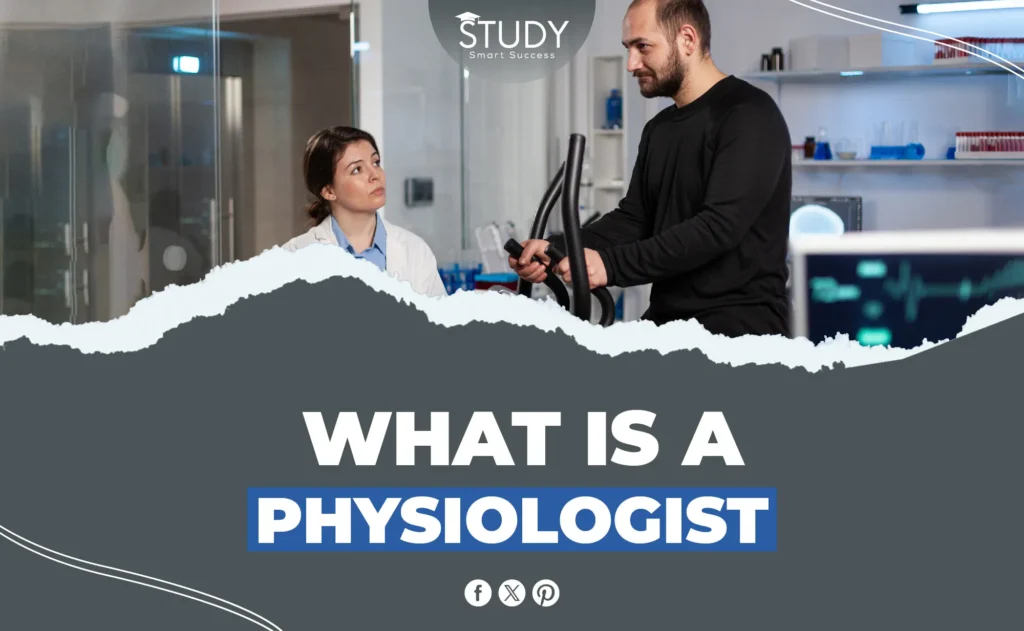Introduction
Physiologists are highly trained scientists who study the complex operations of the human body, from cells to organ systems. Their expertise is needed to understand the body’s vital systems like breathing, circulation, digestion, and brain function. In this article we’ll explore the What is a Physiologist?
Read more about How to Become a Zoologist?
Medical advances, athletic performance optimization, disease prevention, and therapy development depend on physiologists’ findings. Many healthcare and fitness advances would not have been feasible without physiologists.
Definition of a Physiologist
Physiologists study living things, especially humans. They study how organs, cells, tissues, and systems sustain life. Doctors and surgeons diagnose and treat diseases, but physiologists study bodily functioning.
They study how muscles produce energy during activity, how the heart pumps blood, and how the brain regulates body temperature. Physiologists are crucial to medical research and healthcare developments because they understand how the body reacts to external and internal stimuli.
Areas of Study in Physiology
- Cellular Physiology: Cellular physiology studies cells, life’s basic units. This field studies how cells communicate, produce energy, absorb nutrients, and remove waste. Understanding cellular physiology aids in basic illness diagnosis and treatment.
- Systemic Physiology: This branch of physiology examines how the circulatory, respiratory, and neurological systems act together and independently. Systemic physiology helps explain how the body maintains homeostasis and reacts to exercise, stress, and illness.
- Exercise Physiology: Exercise physiology examines how the body adjusts to exercise. This section studies heart rate, muscular performance, metabolism, and respiration during exercise, which is important for athletes and fitness enthusiasts trying to improve or recover from injuries.
- Comparative Physiology: Comparative physiology compares species’ physiological processes. Evolutionary biology and understanding how organisms adapt to their environments are crucial to understanding human health and disease.
- Endocrine Physiology: This branch examines hormones and body function. Endocrine physiologists research how thyroid, pancreatic, and adrenal hormones influence metabolism, growth, and reproduction. Endocrine physiology is needed to diagnose and treat diabetes, thyroid disorders, and growth deficiencies.
Types of Physiologists
- Clinical Physiologists: These professionals treat patients in hospitals and clinics. Their understanding helps them diagnose and treat heart, respiratory, and metabolic diseases. Clinical physiologists typically provide comprehensive care to doctors and other healthcare providers.
- Research Physiologists: Research physiologists conduct experiments in academic or laboratory settings to learn how the body works. They may investigate cell responses to new medications or bodily reactions to harsh settings like high altitudes or space travel.
- Exercise Physiologists: Fitness and performance specialists and exercise physiologists work with athletes, fitness facilities, and rehabilitation patients. They provide personalized fitness programmers to improve sports performance, prevent injuries, and speed recovery.
- Environmental Physiologists: Environmental physiologists research body-environment interactions. They may study how extreme temperatures, altitudes, and pollution affect health. Their research is crucial for understanding climate change’s health implications and training astronauts.
- Neurophysiologists: Neurophysiologists study the brain and spinal cord. They research how neurological illnesses and injuries affect neurons and body processes. Neurophysiologists diagnose and understand epilepsy, MS, Parkinson’s, and Alzheimer’s. They routinely employ advanced brain activity monitoring devices like EEG.
Roles and Responsibilities of a Physiologist
The specific roles and responsibilities of a physiologist vary based on their field of specialization:
- Conducting Experiments: Physiologists conduct experiments to test bodily theories. To explore how variables affect physiological processes, these experiments may use humans, animals, cell cultures, or computer models.
- Analyzing Data: Physiologists use statistical approaches to assess experiment data. This stage is essential for accurately assessing how different factors affect physiological functioning, such as how new medications or food and exercise affect the body.
- Developing Treatments: Based on their research, clinical physiologists may discover new treatments for disorders. Their research helps develop medicines to regulate blood pressure or improve muscle regeneration after injury.
- Collaboration: Physiologists work with doctors, physical therapists, dietitians, and biomedical engineers. Their participation is crucial to developing interdisciplinary solutions for complex health concerns or athletic performance.
- Teaching and Publishing Research: Scientists and healthcare professionals learn from physiologists who lecture in universities and medical schools. Their research in scientific journals advances human physiology worldwide.
Educational Requirements
Becoming a physiologist typically requires a strong academic foundation, along with several years of specialized education and training. Here’s a breakdown of what is needed to enter this field:
- Bachelor’s Degree: A bachelor’s degree in biology, physiology, or biomedical sciences is required to become a physiologist. Human anatomy, biochemistry, cell biology, and basic medical sciences are covered in this undergraduate program. Physiology courses also teach how body systems work, which is essential for advanced study.
- Advanced Degrees (Master’s or Ph.D.): Graduate degrees are required for most physiologists. Master’s degrees in exercise, cardiovascular, and neurophysiology expand on physiological studies. A physiology or subfield PhD leads to advanced research and academic careers. PhD students experiment and innovate. This degree is necessary for research, academia, and advanced clinical employment.
- Certification and Licensing: Different regions or countries may demand professional certificates or licensure for various subfields of physiology, such as clinical physiology. To work in hospitals, clinical physiologists may need medical or health board certification. Certification shows experience and may boost work opportunities, especially in competitive sectors.
- Continued Education and Specialization: Lifelong learning is required for physiologists. To keep up with field technology, research, and methods, continuing education is necessary. Physiologists can specialize in endocrinology, sports, or rehabilitation. Specializations generally require further training and certification to achieve the maximum degree of expertise.
Work Environment
Physiologists can work in a wide variety of settings, each offering unique opportunities and challenges:
- Hospitals and Clinics: Diagnosis and treatment of physiological problems is the responsibility of clinical physiologists. They may collaborate with doctors, nurses, and other healthcare professionals to provide comprehensive patient care.
- Research Institutions: Universities, government agencies, and private research groups employ research physiologists. They undertake studies and advance scientific knowledge to solve difficult health issues or understand the body.
- Universities: Academic physiologists may juggle research with teaching. They mentor aspiring scientists and healthcare providers and publish scholarly research.
- Fitness Centers and Sports Organizations: Gyms, rehab centers, and professional sports teams employ exercise physiologists. They provide customized training programmers to improve performance, treat injuries, and stay healthy.
Why Become a Physiologist?
Becoming a physiologist is a fulfilling career path for individuals passionate about human health, biology, and the sciences. There are several compelling reasons to pursue this field:
- Diverse Career Opportunities: Physiologists work in healthcare, academia, research, fitness, and environmental science. Professionals can choose occupations that match their interests and ambitions due to this versatility.
- Contributing to Medical Advancements: Physiologists are vital to medical progress. Their research improves illness understanding, therapy development, and patient outcomes, directly impacting society.
- Interdisciplinary Collaboration: Physiologists work with doctors, engineers, and nutritionists. This integrative approach to solving complicated health and performance issues makes the work dynamic and exciting.
- Contributing to Global Health Challenges: Physiologists are essential for obesity, CVD, and diabetes management. Their research improves millions of lives worldwide through public health, prevention, and treatment. Physiologists lead large-scale health challenges by studying how lifestyle, genetics, and environment affect bodily function.
- Constant Innovation and Learning Opportunities: Physiology evolves as discoveries and technology shape our understanding of the body. Physiology offers infinite opportunities for those who love science to learn and contribute to cutting-edge research in genetics, biochemistry, and biomedical engineering.
Conclusion
In conclusion, physiologists help us understand how the body works, improving healthcare, fitness, and quality of life. In hospitals, labs, and with athletes, physiologists enhance human health. Suppose you love science and biology and want to change the world. In that case, becoming a physiologist is a rewarding and exciting job.


